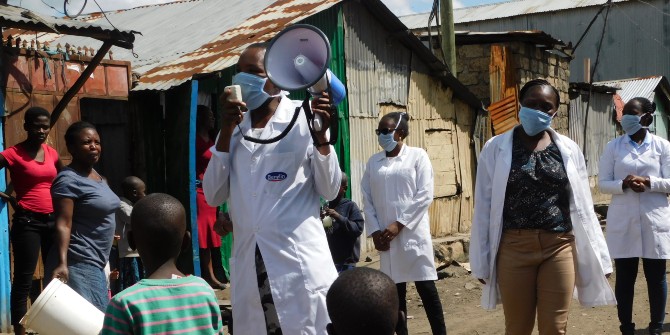Early in the pandemic, rumours spread that Africans and people of African descent enjoyed immunity to COVID. Later, people’s understandings of how the virus is transmitted changed, focusing on the perceived risks posed by migrants, drivers, traders and other mobile individuals. Liz Storer and Cristin Fergus (LSE) explain how ‘infodemiology’ informs our understanding of the pandemic.
As COVID-19 has spread around the world, so has the accompanying “infodemic” – a parallel realm of mis- and dis-information, shared both online and offline, which contests the reality of the virus, its origin, and purported protections and cures. According to the World Health Organization, “infodemiology” – the study of such information and its management – must be considered alongside epidemiology. Misinformation costs lives. Throughout the pandemic, there have been countless examples of how mis- and disinformation have countered public health campaigns. In the UK and the US, these include rumours that 5G masts were spreading COVID, leading to the destruction of mobile phone towers. Anti-vaxxer campaigns have resisted vaccination programmes, and Donald Trump suggested that the consumption of bleach might promote immunity.
Tracing how specific types of misinformation are transmitted and how particular notions do (or do not) become plausible among specific populations is a complex task. These processes occur on awkward scales, merging virtual and social worlds, making them notoriously difficult to study, and requiring creative methodological approaches. In many places, social distancing requirements have made ethnography impossible.
However, we do have extensive social science research from previous epidemics, and public health experts interested in infodemiology could draw on it. Large scale survey data and media reporting from Ebola epidemics in West and Central Africa revealed connections between engagement with public health facilities and mistrust of health workers and government officials. Anthropologists elucidated complex histories where mistrust and rumours were produced, acted upon, and contested. Interestingly too, scholars highlighted how this rumourscape shifted over time, particularly as survival rates increased in public health facilities. On the ground, direct links between knowledge of conspiracies or rumours and avoidance of public health campaigns do not present in simple ways. Social realities are multiple, and change in response to evidence.

In contrast to Ebola, which was portrayed as an African epidemic, much research on COVID has emphasised people’s understandings of African immunity. Leona Vaughn and her team summarise how, since COVID was first attached to Asian and Caucasian bodies, there have been suggestions that the bodies of Africans and those of African descent contain an inherent immunity to the virus. Low reported rates of COVID in many African countries for much of 2020 fuelled these essentialist understandings, which are worrying for public health officials trying to control the virus.
Viral risk became attached to specific, mobile bodies, including drivers, border migrants, traders, urban relatives, and later to young people who defied lockdowns
In the Local Evidence and Decision Making (LEAD) project, hosted in the Firoz Lalji Institute for Africa, we have been tracing evolving understandings of COVID in the African Great Lakes region since April 2020. In Kenya, Malawi, Tanzania and Uganda, we have conducted extended (remote) interviews with project collaborators, focused on how understandings of the virus evolve in different contexts. Though limited by distance, this approach has permitted in-depth, extended conversations away from state capitals.
We have found that ideas about immunity have quickly evolved to incorporate localised ways of explaining the transmission of COVID. As cases were registered in Great Lakes countries, people’s ideas evolved to understand transmission of the virus as based on mobility. Lockdowns in early and mid-2020 brought about differential patterns of mobility, and we found that processes of “othering” attached risk to particular people. Viral risk became attached to specific, mobile bodies, including drivers, border migrants, traders, urban relatives, and later to young people who defied lockdowns. Those deemed most threatening varied from place to place, and were related to testing regimes, as well as memories of HIV/AIDS or Ebola. Ideas of immunity quickly changed to more intimate notions of risk, adapted to the local context.
Our data suggests that notions of risk do not exist in a parallel realm to the ‘expert’ science of epidemiology. They were entangled with testing and clinical histories of places. In this way, rumours drew on reported caseloads, shifting as cases were registered among particular populations. Ways of comprehending the spread of COVID were both complex and place-dependent.
If international public health experts truly want to “flatten the infodemic curve”, it is important to undertake sustained research across space and time, to capture the oscillating rumours which shift with official viral statistics, local perceptions of caseloads, and public health interventions. Infodemics must not be abstracted in the same way as epidemiological data.
This post represents the views of the authors and not those of the COVID-19 blog, nor LSE.




